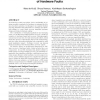Free Online Productivity Tools
i2Speak
i2Symbol
i2OCR
iTex2Img
iWeb2Print
iWeb2Shot
i2Type
iPdf2Split
iPdf2Merge
i2Bopomofo
i2Arabic
i2Style
i2Image
i2PDF
iLatex2Rtf
Sci2ools
ISCA
2010
IEEE
2010
IEEE
Relax: an architectural framework for software recovery of hardware faults
As technology scales ever further, device unreliability is creating excessive complexity for hardware to maintain the illusion of perfect operation. In this paper, we consider whether exposing hardware fault information to software and allowing software to control fault recovery simplifies hardware design and helps technology scaling. The combination of emerging applications and emerging many-core architectures makes software recovery a viable alternative to hardware-based fault recovery. Emerging applications tend to have few I/O and memory side-effects, which limits the amount of information that needs checkpointing, and they allow discarding individual sub-computations with small qualitative impact. Software recovery can harness these properties in ways that hardware recovery cannot. We describe Relax, an architectural framework for software recovery of hardware faults. Relax includes three core components: (1) an ISA extension that allows software to mark regions of code for sof...
Related Content
| Added | 10 Jul 2010 |
| Updated | 10 Jul 2010 |
| Type | Conference |
| Year | 2010 |
| Where | ISCA |
| Authors | Marc de Kruijf, Shuou Nomura, Karthikeyan Sankaralingam |
Comments (0)

